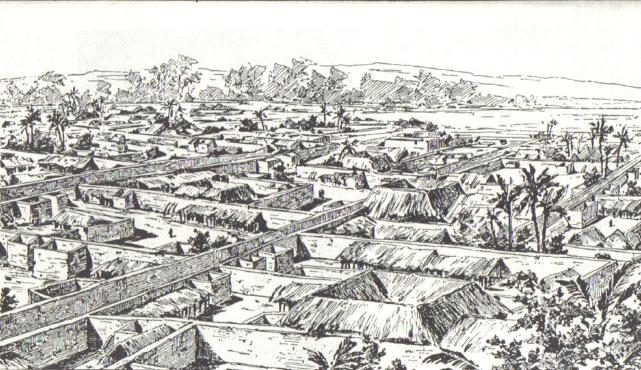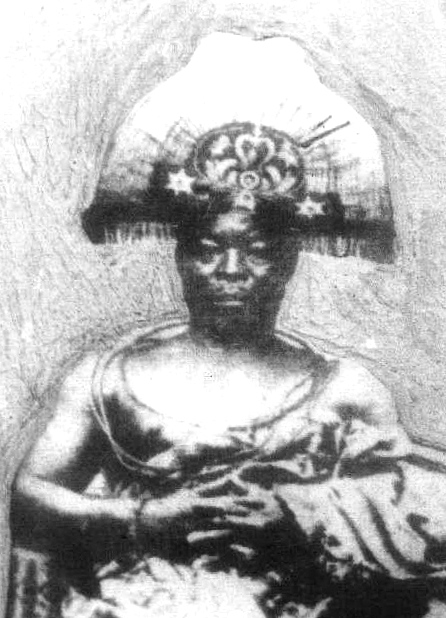|
Uzama
The Uzama also known as King Makers in the Benin Kingdom, are among the highest ranking chiefs in Benin History. Just like the Oyomesi of the old Oyo empire, the Uzama are saddled with the responsibility of crowning a new king in the Benin Kingdom (modern day Benin City Benin City is the capital and largest city of Edo State, Edo State, Nigeria. It is the fourth-largest city in Nigeria according to the 2006 census, after Lagos, Kano (city), Kano, and Ibadan, with a population estimate of about 3,500,000 as of ...). From ancient Benin History, the Uzama reign started during the Ogiso era and they consist of four chiefs which is headed by Chief Oliha. Other chiefs holding the Uzama title include Edohen, Ero and Eholo Nire. While the Chiefs were responsible for crowning the King or the Oba of Benin, they do not have the power to choose the king. See also * Kingdom of Benin * Oba of Benin * List of the Ogiso References Edo people {{Nigeria-stub ... [...More Info...] [...Related Items...] OR: [Wikipedia] [Google] [Baidu] |
Benin City
Benin City is the capital and largest city of Edo State, Nigeria. It is the fourth-largest city in Nigeria according to the 2006 census, after Lagos, Kano, and Ibadan, with a population estimate of about 3,500,000 as of 2022. It is situated approximately north of the Benin River and by road east of Lagos. Benin City is the centre of Nigeria's rubber industry, and oil production is also a significant industry. The city was the most important settlement of the Edo Kingdom of Benin, which flourished during the 13th to the 19th century. It held important trade relations with Portugal during the last centuries before being captured, sacked and burnt in 1897 by a British punitive expedition. Many bronze sculptures in Benin City palace, collectively termed the Benin Bronzes, were taken by the British who followed up their victory by gradually colonizing the area, eventually incorporating the region into Colonial Nigeria. The indigenous people of Benin City are the Edo peopl ... [...More Info...] [...Related Items...] OR: [Wikipedia] [Google] [Baidu] |
List Of The Ogiso
This is a list of the independent Ogisos (Kings) of Igodomigodo, which was to become the Benin Empire, from 40 BCE to 1100 CE. The dating is based on the recollection made by Daryl Peavy of the oral traditions of the Edo people. The Ogiso were assisted by seven nobles called the "Uzama". During the reign of ogisos, Edo lands were called Igodomigodo and they had administrative centers or capitals at Ubinu which was later called Benin City Benin City is the capital and largest city of Edo State, Nigeria. It is the fourth-largest city in Nigeria according to the 2006 census, after Lagos, Kano, and Ibadan, with a population estimate of about 3,500,000 as of 2022. It is situated .... Community autonomy was given to each community by the Ogiso during their reign. References {{reflist External links edo-nation.net Edo people History of Nigeria Ogiso Ogiso Kingdom of Benin ... [...More Info...] [...Related Items...] OR: [Wikipedia] [Google] [Baidu] |
Kingdom Of Benin
The Kingdom of Benin, also known as the Edo Kingdom, or the Benin Empire ( Bini: '''') was a kingdom within what is now southern Nigeria. It has no historical relation to the modern republic of Benin, which was known as Dahomey from the 17th century until 1975. The Kingdom of Benin's capital was Edo, now known as Benin City in Edo State, Nigeria. The Benin Kingdom was "one of the oldest and most developed states in the coastal hinterland of West Africa". It grew out of the previous Edo Kingdom of Igodomigodo around the 11th century AD, and lasted until it was annexed by the British Empire in 1897. Oral traditions The original people and founders of the Benin Kingdom, the Edo people, were initially ruled by the Ogiso (Kings of the Sky) who called their land Igodomigodo. The first Ogiso (Ogiso Igodo), wielded much influence and gained popularity as a good ruler. He died after a long reign and was succeeded by Ere, his eldest son. In the 12th century, a great palace intrigu ... [...More Info...] [...Related Items...] OR: [Wikipedia] [Google] [Baidu] |
Oyo Mesi
The Oyo Mesi is the privy council of Oyo, a Yoruba traditional state in Southwestern Nigeria. It dates to the medieval period, when it served as the government of a powerful pre-colonial state that was known as the Oyo empire. History The Oyo Mesi was made up of the most powerful noblemen in imperial Oyo. No emperor, or '' Alaafin of Oyo'', was capable of being enthroned in the capital without the prior consent of and performance of rituals by these seven titleholders. They were a ruler's principal advisors and sacred officiants, and also served a variety of judicial and administrative functions in his realm. Led by the ''Bashorun'' (or hereditary "Prime Minister"), the Oyo Mesi were also expected to serve as a check on the despotic authority of each individual emperor that they crowned. In the event of any given reign having descended into tyranny, the Bashorun - after having put the matter to a vote in the Oyo Mesi previously - was expected to perform a traditional rite duri ... [...More Info...] [...Related Items...] OR: [Wikipedia] [Google] [Baidu] |
Oyo Empire
The Oyo Empire was a powerful Yoruba people, Yoruba empire of West Africa made up of parts of present-day eastern Benin and western Nigeria (including Southwest zone and the western half of Northcentral zone). It grew to become the largest Yoruba language, Yoruba-speaking state and rose through the outstanding organizational and administrative skills of the Yoruba people, wealth gained from trade, and a powerful cavalry. The Oyo State, Oyo Empire was one of the most politically important states in the entirety of Western Africa from the mid-17th to the late 18th century, and held sway not only over most of the other kingdoms in Yorubaland, but also over nearby African states, notably the Fon people, Fon Kingdom of Dahomey in the modern Republic of Benin on its west. History Legend of origin The origins of the Oyo Empire lie with Oranyan (also known as Oranmiyan), the last prince of the Yoruba Kingdom of Ile-Ife (Ife). Oranmiyan made an agreement with his brother to launch a ... [...More Info...] [...Related Items...] OR: [Wikipedia] [Google] [Baidu] |
Oba Of Benin
The Oba of Benin is the traditional ruler and the custodian of the culture of the Edo people and all Edoid people. The then Kingdom of Benin (not to be confused with the modern-day and unrelated Republic of Benin, which was then known as Dahomey) has been and continues to be mostly populated by the Edo (also known as Benin ethnic group). In 1897, a British military force, of approximately 1,200 men, under the command of Sir Harry Rawson, mounted the Benin punitive Expedition. The force dispatched in retaliation to the ambush of a British party, at Ugbine village near Gwato, on the 4th January 1897, by a group of Benin soldiers, acting without orders from the Oba; the ambush had led to the deaths of all but two of the British party. The British force captured the capital of the Kingdom of Benin, sacking and burning the city while forcing the Oba of Benin, Ovonramwen, into a six-month exile. The expeditionary force consisted of both indigenous soldiers and British officers b ... [...More Info...] [...Related Items...] OR: [Wikipedia] [Google] [Baidu] |



